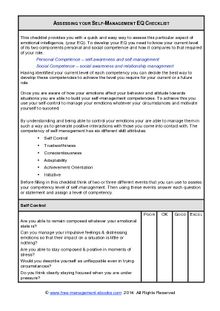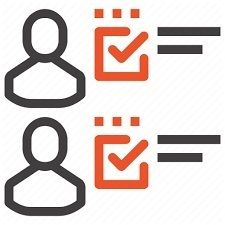Assessing Self-Management Checklist
 PDF
PDF
This checklist provides you with a quick and easy way to assess the self-management aspect of emotional intelligence. You often have little control over when you experience emotions. You can, however, have some say in how long an emotion will last by using a number of techniques to alleviate negative emotions such as anger, anxiety or depression. A few of these techniques include recasting a situation in a more positive light. Self-management involves: managing disruptive impulses, maintaining standards of honesty and integrity, taking responsibility for your own performance, handling change with flexibility, and being open to new ideas.
Daniel Goleman's book titled, 'Emotional intelligence why it can matter more than IQ' defined emotional intelligence as:
'Understanding one's own feelings, empathy for the feelings of others and the regulation of emotion in a way that enhances living'.
This book made two claims, which turned it into a best seller. Firstly, that an individual's success may be more to do with their emotional intelligence than their IQ and secondly, that a person's EQ could be improved, unlike their IQ. This supported the growing need for continuing an individual's personal development so that they were better able to handle the greater level of autonomy at work.
Since the mid 1990's this has helped to show EQ as an increasingly important aspect of being successful in the workplace. With organizations' having fewer levels of authority management styles are now less autocratic and roles need individuals to have a wider knowledge base and the ability to work well in a team and with customers.
To develop your EQ you need to know your current level of its two components personal and social competence and how it compares to that required of your role.
• Personal Competence - self-awareness and self-management
• Social Competence - social awareness and relationship management
By comparing these two levels you will identify the areas of your EQ that need to be developed. You may need to adjust the 'high level' descriptions used in this checklist so that they match those of your role and organization.
Once you are aware of how your emotions affect your behavior and attitude towards situations you are able to build your self-management competencies. To achieve this you use your self-control to manage your emotions whatever your circumstances and motivate yourself to succeed.
By understanding and being able to control your emotions your are able to manage them in such a way as to generate positive interactions with those you come into contact with. The competency of self-management has six different skill attributes:
• Self Control
• Achievement Orientation
• Initiative
• Trustworthiness
• Adaptability
• Conscientiousness
Download "Assessing Self-Management Checklist.pdf"



 PDF
PDF
 PDF
PDF
 PDF
PDF
 PDF
PDF